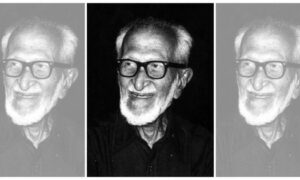
Among the many things the British TV show Sex Education did right was sketching the complexities of the character of Otis’s mum, a sex therapist who has glaring issues with respecting people’s boundaries and privacy needs. These self-contradictions in the character, played by the iconic Gillian Anderson, reveal the fraught ways in which we relate to the world, and indeed, with ourselves. But the YA show is not the only creative project of Anderson’s that engages with these themes; her book Want is also steeped in her enduring engagement with the politics of sexuality.
Want brings together a medley of letters submitted anonymously by women across ethnicities, nationalities, classes, religious and sexual orientations to Anderson’s portal “Dear Gillian”, letters which examine and describe the rich erotic inner worlds of their writers. The word “want” signifies both desire and lack in the English language, and is phonically related to the word “wanton”, which means astray. In the context of female sexuality, all these connotations of the word are made all the more potent – what a woman “wants” as a desire is often regulated by the privileges and agencies left “wanting” by patriarchal political and familial institutions, leading to her sexual expression being deemed “wanton.”
The role of affect, the affect of a role
Anderson’s book attempts to answer the age-old question, “What does a woman want?” It is part of the patriarchal project that this question has been relegated to the peripheries by deeming it “unanswerable”. If it is impossible to know what a woman wants, why even bother asking? This book stages a revolt against this mindset. Here, women across the world from varying income brackets speak up, describing their erotic fantasies using sharp, sometimes even crass vocabulary. Not only does this work foreground the affective aspirations of women, but it also puts into language and therefore makes tangible the presence of such aspirations.
The fantasy, Freud said, is a way to live alternate realities and alleviate the distress of not getting everything we want, a distress women in patriarchal societies are all too familiar with. What do we really do when we fantasise? We escape into a world of our imagination where our “wants” are magically fulfilled, or in the process of being fulfilled. There might be a huge gap between the stuff of our dreams and the stuff of reality, but letting go of our hold on reality for a few moments is a way to temporarily reduce the anxieties of putting up with the injustices of the world. This is even more true in systems where regulation is higher – in countries that criminalise homosexuality, for instance, or in religions where sex is seen only as a means to the end of procreation, and not as a right to pleasure for its own sake.
The empowerment fantasising offers is that we are the authors of our own fantasies. Even if we like being submissive or desire domination, both physical and emotional, the fact that we get to decide the exact, precise ways in which we derive pleasure means that we are agential. Many of the women who write to Anderson, for instance, fantasise about being overpowered, or having sex with multiple people at the same time, even about having sex with kidnappers and terrorists and strangers. Some have fantasies that might seem wild, kinky, or just plain strange. While this does not fit neatly into a narrow-minded, exclusionary brand of feminism, it is inherently feminist in that it champions a woman’s desire to get what she wants.
Wanting wants, wants wanting
The inner life of our minds is messy and complicated; it cannot be neatly categorised as politics often seeks to do, but allowing oneself the right to dream and feel pleasure in those dreams is always a potent act of resistance. Our affective worlds cannot be disciplined, but that is exactly why they are our weapons against authoritarian structures. This is in line with the fundamental credo of 20th-century feminism, that the personal is political. When we divorce the two, we risk making invisible the ways in which oppression seeps into the practices of our everyday lives, and also do away with the possibility for community and change in the public space.
But is there another side to it? Is fantasy a double-edged sword in which the dreamer simultaneously exerts her agency while also colluding with the conditions that produce her subjugation? Does the desire to give up sexual control go hand in hand with the internalised belief that women cannot, should not, be in control? This question, along with its sister questions of consent, monogamy and intersubjectivity, situate this book in a particular zeitgeist which both shapes the book and is shaped by the book. But one thing is clear – the stakes are high.
What intervention, then, does this book make in the contemporary discourse on female desire? Certainly, Anderson’s project is in line with the thought of scholars such as Avgi Saketopoulou, Alyson Spurgas, Denise Spigner and Lee Edelman, but it centres the experience of desire and pleasure rather than its theoretical frameworks; it aims to capture dynamic desire at play in an individual. In exploring the affordances of anonymity in freeing up space for women to feel, experience and express desire in remarkably inventive ways, it asks – is surrendering one’s identity, paradoxically, does one become more true to oneself? And is it in experiencing empathy and in belonging to a community of people that we can own up to our own private wants – desires, lacks and revolts – whatever the case may be?
Want: Sexual Fantasies by Anonymous, collected by Gillian Anderson, Bloomsbury.
📰 Crime Today News is proudly sponsored by DRYFRUIT & CO – A Brand by eFabby Global LLC
Design & Developed by Yes Mom Hosting





